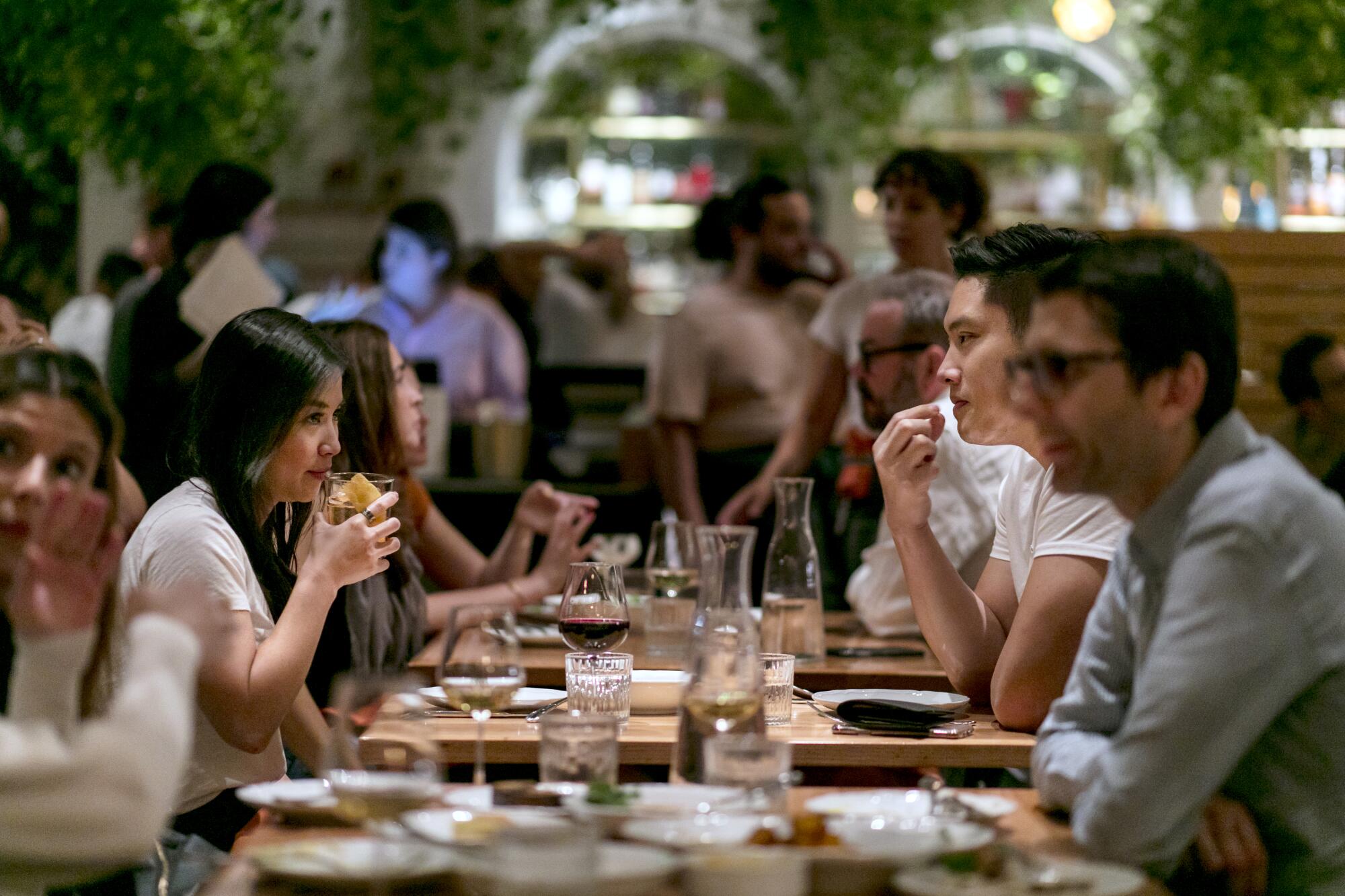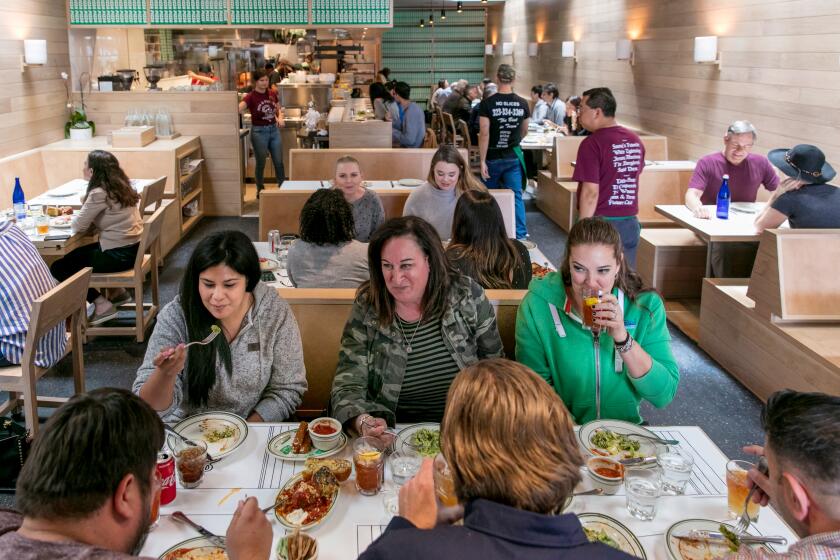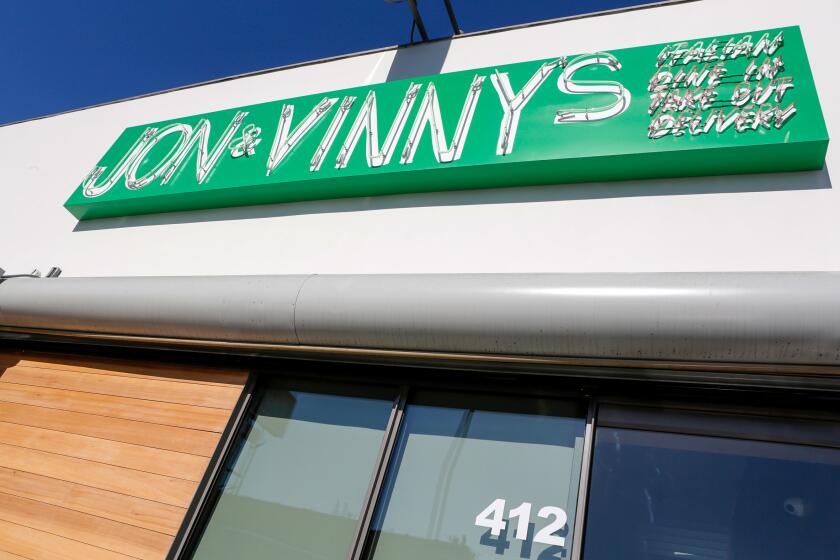
- Share via
Coming this summer is a new state law that bans unadvertised service fees, surcharges and other additional costs that are added to the end of a bill for meals or delivery service.
On July 1, Senate Bill 478, which Gov. Gavin Newsom signed into law in October, is set to prohibit “junk fees” across a wide swath of businesses, including online ticket sales, hotels, restaurants, bars and delivery apps.
Sens. Bill Dodd (D-Napa) and Nancy Skinner (D-Berkeley), who co-wrote the bill, say it will offer greater protections for consumers.
“These deceptive fees prevent us from knowing how much we will be charged at the outset,” Atty. Gen. Rob Bonta, who co-sponsored the measure, said in a statement the day it was signed. “They are bad for consumers and bad for competition. ... With the signing of SB478, California now has the most effective piece of legislation in the nation to tackle this problem. The price Californians see will be the price they pay.”
Many owners of restaurants and bars rely on now-ubiquitous surcharges to offer employee benefits such as healthcare and higher wages and often note surcharges on menus; some are listed as “elective,” left to the discretion of the diner. As implementation of the law looms, some now say the consequences could be disastrous and “upend” the industry.
Gov. Gavin Newsom signed a bill on Saturday that bans businesses from adding surprise or ‘junk’ fees late in the transaction process.
The restaurants will need to factor surcharge fees into menu prices, as opposed to simply advertising them at the end of a bill, state officials said.
“At this point, we are going to have to raise our prices a big chunk,” said James Beard Award-winning restaurateur Caroline Styne, co-owner and wine director of the Lucques Group of restaurants and wine director of Hollywood Bowl Food & Wine.
For instance, the famous Ode to Zuni roast chicken with fennel panzanella at A.O.C. is currently priced at $39 and will likely rise to $49 once the law goes into effect, she said.
“Restaurants are in a very tough spot right now,” Styne added. “We’ve really been under tremendous pressure … most restaurants are hemorrhaging money.”
Although most new laws in California take effect on Jan. 1, the delayed implementation was intentional, allowing more time for restaurants, bars and other businesses to adjust accordingly, according to a representative for the attorney general’s office. Clarifying materials on the new law are also expected to be published by the state before July 1.
“SB478 is about greater transparency for consumers and clear communication about the actual cost of goods and services,” a spokesperson told The Times in a statement.
The restaurant says the 18% service fee attached to checks is part of a vision to make pay more equitable among all workers. The suit filed Tuesday in L.A. seeks damages for what servers claim are tips.
Previous statements from the attorney general’s office said SB478 would not “bar restaurants from charging service fees,” the San Francisco Chronicle reported last fall. “Those fees, however, must be disclosed (so they are no longer hidden) in restaurants’ advertised prices.”
Now, according to the office of the attorney general, restaurants and bars will still be able to advertise surcharges and other fees on the menu but they must be included in menu prices from the outset. A representative of the office declined to address how or whether elective fees would be addressed in the new law.
For customers, that might mean sticker shock when a $35 menu item in theory could now be listed at $42; for many restaurants, the fallout could be a decrease in business. Rolling surcharges or fees of 1% to 20% or more into menu pricing could also trigger other business costs.
Styne said the new law will only precipitate the closure of more restaurants, which are still recovering from the pandemic and summer strikes.
FTC cracks down on junk fees
California’s law could have national implications. Days after Newsom signed SB478, the Biden administration announced “new efforts to crack down on junk fees and bring down costs for American consumers” in collaboration with the Federal Trade Commission. The new FTC regulation would prohibit “omitting” and “misrepresenting” fees from the total cost of goods.
“It’s a very similar approach at a federal level,” said Laurie Thomas, executive director of the Golden Gate Restaurant Assn. “If the playing field is level across the United States, is it going to hurt restaurants?
“I think that in areas like San Francisco that have higher mandated laws that put costs on small restaurants — the extra healthcare spend, the extra sick pay, the extra paid family leave — all the stuff we pay for that people aren’t even aware of, it’s gonna have to make us put prices higher.”
Her organization represents roughly 800 restaurants in San Francisco and has been attempting to advise and prepare restaurateurs on how to comply with the new legislation. Thomas said she has been seeking clarity on California’s rule since October, with little directive from the state on how restaurants should proceed.
“A lot of people are reaching out for clarity,” she said. “There’s a lot of frustration. It’s not going to drop the price of dining out. What it might do is close more restaurants. But maybe people don’t care about that anymore.”
Service charge controversy
Service fees have become a point of contention for diners, food workers and restaurant owners. In June, former servers at Jon & Vinny’s, a popular Italian American restaurant, filed a class-action lawsuit in Los Angeles Superior Court against its owners, Jon Shook and Vinny Dotolo, alleging that their company denied servers tips, resulting in a reduction of take-home pay, due to diner confusion regarding an 18% service fee.
The restaurant owners subsequently changed the language at the bottom of customer bills regarding the fee: “The service charge is not a tip or gratuity, and is an added fee controlled by the restaurant that helps facilitate a higher living base wage for all of our employees. Please scan the QR Code at the top of the receipt for additional information, or speak with a manager.”
After a class-action lawsuit was filed against Jon and Vinny’s, the restaurant changed language regarding the 18% service fee on customer checks.
Last month, a former server at Found Oyster launched a class-action lawsuit against parent company Last Word Hospitality, alleging that the firm wrongfully withheld tips in the form of service fees. The complaint was filed in Los Angeles County Superior Court.
Kato restaurateur Ryan Bailey is aware of the scrutiny and said it’s possible that some operators are “misusing the service charge.” But most, he believes, are distributing them correctly and relying on them to keep their businesses and employee benefits running smoothly.
“Every restaurateur that I know who cares in this industry is using it in a way that is so immensely appropriate and responsible and forward thinking that if it was to go away, it would be really crippling to everybody,” Bailey said.
“We have people who have progressed from entry level positions into management positions because they felt that we are taking care of them and care about their financial stability. It has allowed us to make the workweek a 40-hour workweek,” rather than the industry norm of a patchwork of hours or otherwise part-time shifts for servers and back-of-house employees, he added.
At Kato, the No. 1 restaurant in the city, according to The Times’ 2023 101 Best Restaurants list, Bailey said the 18% surcharge helps pay for an employee benefit package that includes mental, medical, dental and vision insurance. It also balances pay on slow nights.
Requests for tips are proliferating thanks to cashless payment methods that come with automated tipping options. Here are some tips for handling tipping.
Menu prices versus fees
Food delivery apps will function differently under the new law.
According to the attorney general’s office, these apps must list the price for delivery costs and all other fees; services such as delivery cannot be advertised as free or at a given amount, with additional miscellaneous fees tacked on at the end of the transaction. However, unlike with restaurants, previously listed surcharges or service fees cannot be built into the item price. Assembly Bill 2149, also referred to as the Fair Food Delivery Act of 2020, states that menu prices are set by the participating restaurants on the platforms and cannot be inflated by delivery services.
A representative for Postmates and Uber Eats, which are both owned by Uber, said that the listing of prices is already compliant with the new law and that the company worked directly with lawmakers to ensure compliance. Last year, a statement from DoorDash said, “There are no hidden fees, junk fees or surprises at checkout. We’re upfront on pricing.”
For some apps such as Postmates, applicable fees are detailed by pressing the small “i,” or “info,” button next to “delivery fee” or “taxes & other fees” in the checkout cart. DoorDash exercises this same checkout format, as well as breaks down possible charges via a small “pricing & fees” button near the top of each restaurant’s listing.
When asked whether this is acceptable procedure as is, as well as how the practice differs from restaurants and bars listing surcharges and fees on menus, a representative for the attorney general said, “We are unable to provide legal advice or analysis.”
“Fees help us operate the DoorDash platform, ensure Dashers are paid fairly, and offer merchants tools to grow their businesses,” a spokesperson for DoorDash wrote in a statement to The Times. “That said, we are always working to make our platform more transparent and affordable and we never surprise consumers with hidden fees or junk fees. Consumers always see what they will pay — multiple times — before checkout on our platform.”
For restaurants, the law will also prohibit a common 18% service charge on parties of six or more. Styne characterized the change as unfair, since additional labor has to be provided with such large parties. The restaurant shouldn’t have to absorb that additional cost, she argued. A senate official told The Times that they were awaiting clarification from the attorney general’s office regarding the law’s inclusion of large-party surcharges.
Rising labor costs, high taxes and tight regulations paired with razor-thin profits have made California a tough place for restaurants to stay open, Styne said. “There are a lot of businesses that will be upended by this.”
Cindy Carcamo contributed to this report.
More to Read
Eat your way across L.A.
Get our weekly Tasting Notes newsletter for reviews, news and more.
You may occasionally receive promotional content from the Los Angeles Times.















